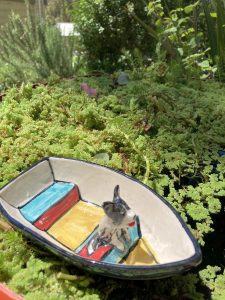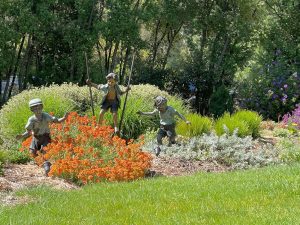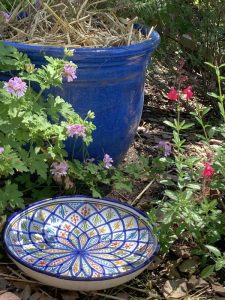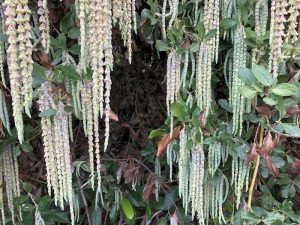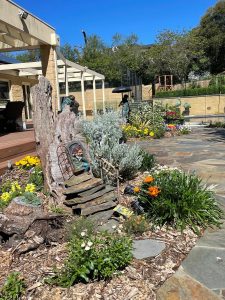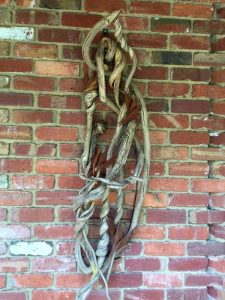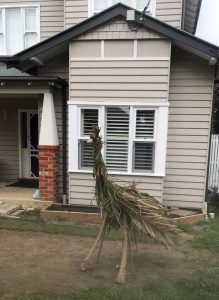Thanks to all the people who have contributed to this week’s newsletter: Ann Stanley, Cathy Romeo, Choon Yin Yeok, Chris Kent, Eliza McCumstie, Fay Loveland, Hui Ouliaris, Jon Buttery, Keryn Johnson, Megan Goodman, Pam Jenkins, Rita Varrasso, Robin Gale-Baker, Soo Mei Leong, Sue Sedelies, Trish Kent and Vanessa Shribman.
It is great when people contribute material for the newsletter. The material can be anything so long as it is food-related: ask a question, provide a tip, discuss an issue, submit a photo, send in a recipe, etc. Email us with your contribution(s).
Re-opening plans
As most of you will know, the lockdown was eased in 22nd October and will be eased further in early November. Some local food organisations have already responded by re-activating their activities. Here is the current situation as far as I can make out.
- A few, but only a few, food swaps have re-started. These include: Blackburn North and Hurstbridge
- A few, but only a few, community gardens have re-opened. These include: Northcote Library, Pentridge and West Brunswick.
- Quite of lot of the events deferred because of the lockdown have now been re-arranged for November or December (as listed later in this newsletter).
This week’s farmers’ markets
Thursday: Alphington Midweek Farmgate.
Saturday: Coburg.
Sunday: Alphington and Eltham.
Organic versus inorganic fertiliser (by Robin Gale-Baker)
The fundamental difference between organic and inorganic fertiliser is their source. Organic fertilisers are derived from living things, including plants, animals and manures, while inorganic are synthetically derived chemicals plus minerals from the earth.
The main active components of all fertilisers are the three macronutrients that all plants need (nitrogen, phosphorus and potassium or N:P:K) plus some micronutrients which are minerals, also known as trace elements. The table below sets out the sources for these components for both organic and inorganic fertilisers.
Component |
Sources for organic fertilisers |
Sources for inorganic fertilisers |
| Nitrogen | Mostly derived from animal manure | Mostly from petroleum |
| Phosphorus | Mineral sources such as rock dust, colloidal phosphate or bone or fish meal | Rock phosphate treated with sulphuric acid which then converts to other substances and finally to superphosphate or via other processes to triple superphosphate |
| Potassium (potash) | Wood ash, kelp, greensand (ancient seabeds) and compost | Potash ores such as kainit and sylvanite |
Those favouring organic fertilisers say that the advantages include:
- The slow release of nutrients.
- The addition of organic material to the soil.
- The resulting ability of the soil to retain moisture.
- Sequestering carbon into the soil.
- It is made from renewable, rather than finite, resources.
- The fact you can produce your own by making compost.
Proponents of inorganic fertilisers (which include many companies producing it and many broad acre farmers) argue that the advantages include:
- High in nutrients.
- Quick release and this results in quicker uptake and growth.
- The exact amount of nutrient needed can be measured and used (no under or over feeding).
- They are less bulky, saving money in transport and spreading costs.
Organic growers argue that, whilst inorganic fertilisers give plants nutrients, they do not build soil fertility, biomass or contribute to moisture retention. They also point to loss of soil through erosion by wind and water when soil is ploughed and bare, the build up of chemical toxicity in the soil from repeated applications, and the degradation of soil long term. Regenerative farmers – 12% of Australian farmers – argue that what makes their farms viable is that they do not have to spend anything on buying fertilisers. Keeping the soil under a cover crop throughout the year, as they do, also builds biomass in the soil and moisture retention for only the cost of the initial cover crop. (Regenerative farmers plug seedlings into the cover crop so that the cover crop roots are always left in while the above ground growth is slashed and pushed back down into the soil mechanically).
Inorganic growers say that organic inputs are too inexact as they are not measurable, result in slow growth, require microbial activity to break them down for plant uptake, and are too bulky and expensive to transport to use on large areas.
As I mentioned in my article last month on seaweed tonics and liquid fertilisers, manufacturers often try to have it both ways – or both markets, you might say, i.e. organic and inorganic – so don’t be taken in by a fertiliser that has ‘organic’ incorporated into its name, e.g. ‘prorganics’ (a name I have made up), as this is to mislead. The packaging needs to state that an organic product is a ‘Certified organic’. There will always be some organic matter in any inorganic fertiliser (the minerals) but this does not make it ‘organic’. Strangely, it does not seem to work the other way: I’ve never seen an organic product presented as an inorganic one.
My peas and the cockatoos (by Pam Jenkins)
[A few weeks ago, we had a discussion about how to deter cockatoos. Pam Jenkins, from Diamond Creek, has now contributed to the debate.]
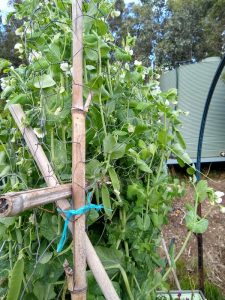 Earlier this year, cockatoos reduced the height of my climbing peas to the size of dwarf peas. My initial response was to cover the peas with nets but the peas continued to grow and started getting tangled in the nets. Then the wind got stronger and the nets started damaging the pea tips so I decided to dispense with them. I hoped that, by then, the cockatoos would have lost interest. But they were back and into mischief within the hour!
Earlier this year, cockatoos reduced the height of my climbing peas to the size of dwarf peas. My initial response was to cover the peas with nets but the peas continued to grow and started getting tangled in the nets. Then the wind got stronger and the nets started damaging the pea tips so I decided to dispense with them. I hoped that, by then, the cockatoos would have lost interest. But they were back and into mischief within the hour!
So, onto my next solution. Remembering that floppy top fences can keep possums at bay, I wondered if something unstable to land on might keep the cockatoos away. I folded some chicken wire to form a rough tube shape and loosely tied it above the wooden frame supporting my peas (see the photo). Hooray! No problems since then.
Jon’s podcast of the week
Watch this video, which is a lecture rather than a podcast. The subject is soil biology and the material includes nitrogen-fixing microbes and the importance of multiple species to promote diversity in cover crops.
Julian Fang, departing manager of Alphington Farmers’ Market, has recommended three podcasts in the latest newsletter from Melbourne Farmers Markets:
- One bite by Xavier Calluaud, which explores the work of various Australian influencers (Costa Georgiadis, Alice Zaslavsky, Tammi Jonas, etc) on changing the food system.
- Dirty linen by Dani Valant.
- Cooking the books by Robbie Bell, who is part of local food producer City Larder.
Do you know?
Get your thinking caps on and your typing fingers at the ready because we have a lot of questions this week.
Herbicide in compost
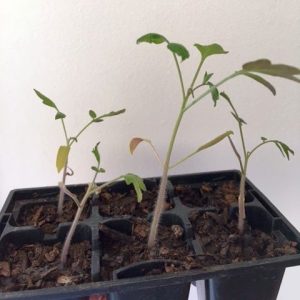 Eliza McCumstie writes in: “I first encountered herbicide in bought compost a few years ago and lost all my tomatoes. It was devastating and no one seemed to know much about it. This year, I used a certified organic compost to pot my tomatoes up and it’s happened again (see photo), where I used Angelo Eliades’ article on how to identify and treat herbicide contamination of commercial soil, compost and manure to diagnose the problem. I thought I’d be safe with a certified organic product but unfortunately that was not the case. It’s such a waste of effort when you put all the time into growing seedlings only to have to throw them away. Whilst I make my own compost, it is not enough for all my garden beds and I need the convenience of a ready-made product for growing seedlings. So, my question is this: can anyone recommend a safe and trustworthy source for compost?” Email your replies.
Eliza McCumstie writes in: “I first encountered herbicide in bought compost a few years ago and lost all my tomatoes. It was devastating and no one seemed to know much about it. This year, I used a certified organic compost to pot my tomatoes up and it’s happened again (see photo), where I used Angelo Eliades’ article on how to identify and treat herbicide contamination of commercial soil, compost and manure to diagnose the problem. I thought I’d be safe with a certified organic product but unfortunately that was not the case. It’s such a waste of effort when you put all the time into growing seedlings only to have to throw them away. Whilst I make my own compost, it is not enough for all my garden beds and I need the convenience of a ready-made product for growing seedlings. So, my question is this: can anyone recommend a safe and trustworthy source for compost?” Email your replies.
What’s eating the passionfruit?
Vanessa Shribman asks: “Can anyone suggest how to protect passionfruits? I only had 3 ripe ones last year although there were many green ones which mysteriously disappeared. The same critter took large bites out of the tomatoes. Possums or rats? Any suggestions?” Email your replies.
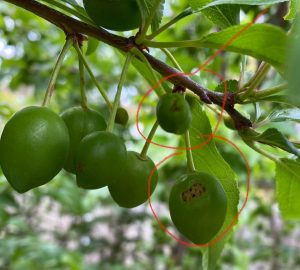 What’s attacking the plums?
What’s attacking the plums?
What is attacking Trish Kent’s plums (see the photo) and how should she treat it? Email your replies.
Foodbank’s annual Hunger Report
“The Foodbank Hunger Report is an annual spotlight on food insecurity in Australia bringing together Foodbank’s research and on-the-ground information and observations.” Read their 2021 report (32 pages). Read their website overview of the report
Bundoora Park Community Garden
“The team at the farm have been working hard to improve our community gardens during the lockdown, so Gardener Stacy thought she’d take you on a tour.” Watch the video (3 minutes).
Some suggestions from Chris Kent
Got a loquat tree?
If you have a loquat tree, you know that its fruit will be ripe in November and that you are quite likely to have much more fruit that you can use.
According to ABC News, Melbourne fruiterer Thanh Truong wants to buy your excess loquats. If you think you have at least 4Kg surplus, direct message him on Instagram.
Want to watch some free films?
Kanopy is a website where anyone with a library card can watch up to 6 films per month for free. Chris Kent recently used it to watch Seed: The Untold Story, which is a film about the importance of heirloom seeds to the agriculture of the world, focusing on seed keepers and activists from around the world.
Meg’s garden this month
The rain has filled the tanks and there are now deep puddles around the veggie beds. It is still too early on our south-facing block to pot up the seedlings that we have started indoors but summer is on its way with the Spring blossom on the pears and apples setting to tiny fruits in the past week or so. The cool weather and rain has ensured that the cos lettuce is full hearted and delicious and that the spinach is yet to run to seed.
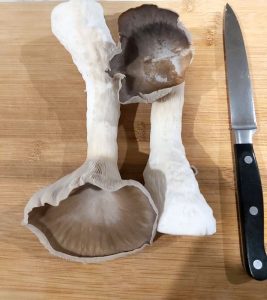 We have recently been trialling mushroom kits (with great success). The current kits are much improved over the old Styrofoam box kits that I have dismally failed with in the past. We have successfully grown both Shitake and Oyster mushrooms (see photo) in a large clear box in our bathroom. The family has missed hunting for field mushrooms this year with Grandma at the farm, but watching them grow has been fascinating. I did manage to obtain Grandma’s recipe for her breadcrumb topping for field mushrooms (it would be good on a slow roasted tomatoes too).
We have recently been trialling mushroom kits (with great success). The current kits are much improved over the old Styrofoam box kits that I have dismally failed with in the past. We have successfully grown both Shitake and Oyster mushrooms (see photo) in a large clear box in our bathroom. The family has missed hunting for field mushrooms this year with Grandma at the farm, but watching them grow has been fascinating. I did manage to obtain Grandma’s recipe for her breadcrumb topping for field mushrooms (it would be good on a slow roasted tomatoes too).
This month I am:
- Counting down the days until we can head to finally see the grandparents on the farm.
- Harvesting the last of the Emperor mandarins (this large variety takes a long time to ripen in Melbourne).
- Trying to sort the various unlabelled cucurbit seedlings from one another.
- Telling myself to wait until the threat of frost has passed before planting them out.
Breadcrumb topping for mushrooms
1 cup fresh breadcrumbs
? cup grated parmesan cheese
2-3 tablespoons finely chopped fresh parsley
leaves from 2-3 springs of thyme
2 cloves of garlic, crushed
Mix all the ingredients with enough olive oil to bring the mixture together. Season to taste and then press the mixture onto mushrooms. Bake at 180degC for about 15 minutes.
Read more of Megan Goodman’s recipes on our website.
Guy’s veggie growing tip of the week – grow sugar snap peas over Summer
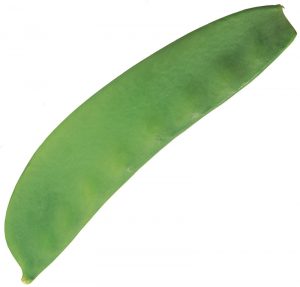 In the UK, where I come from, broad beans and peas are both warm season vegetables which you plant in early Spring and grow over summer. That fitted with my intuition that access to more sun and heat help the juicy beans and peas to develop. But, as standard green beans are also a warm season vegetable, that means that, in the UK, there are too many legumes competing for space in your legume bed over Summer and too few legumes that you can grow in your legume bed over Winter.
In the UK, where I come from, broad beans and peas are both warm season vegetables which you plant in early Spring and grow over summer. That fitted with my intuition that access to more sun and heat help the juicy beans and peas to develop. But, as standard green beans are also a warm season vegetable, that means that, in the UK, there are too many legumes competing for space in your legume bed over Summer and too few legumes that you can grow in your legume bed over Winter.
When I came to Australia, I found, to my surprise, that broad beans and peas are both cool season vegetables here. At first, I found this a bit disconcerting as it showed (once again) that my intuition can be wrong. But, on further reflection, I became delighted as it means that I can grow broad beans and peas over Winter and then standard green beans over summer. And it also means that I have some spare space in my legume bed over Summer (there are only so many green beans one can eat) to grow a second ‘experimental’ legume, such as peanuts or soybeans. But sometimes being experimental is a bit too much of a fag and one hankers to grow standard vegetables. That is when I discovered that sugar snap peas (but not standard garden peas) can be grown all year round. So, last November, after harvesting the broad beans, we planted some sugar snap pea seedlings and the crop grew beautifully.
So here’s my tip: if you have some spare space in your legume bed after harvesting your broad beans, grow some sugar snap peas.
Read more of my veggie growing tips.
What seeds to plant in November
Here is a list (see the planting guide for more detail):
Warm season veggiesBeans |
Leafy greensLettuce |
RootsBeetroot |
PerennialAsparagus |
Compared with October, the list gets a bit shorter, with some summer veggies dropping off (e.g. rockmelon, watermelon and zucchini) and with nothing added. But there’s still lots that you can plant during November. Or, of course, you can buy seedlings for any of the summer veggies.
The photo competition
The results of last week’s competition
The theme was ‘garden art’ and attracted 14 entries. Thanks, everyone!
The winner, as judged by our panel, was Soo Mei Leong’s Covid wombat.
Commendations to Ann Stanley’s dog in a boat and to Hui Ouliaris’ kids playing on the lawn.
This week’s competition
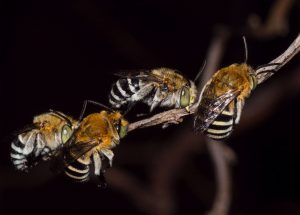 As we are now out of lockdown, it is time for this newsletter to focus again on upcoming events. But I thought that we would have one last photo competition, with the theme being ‘your best ever food- or garden-related photo’. Email your photos together with some words about them.
As we are now out of lockdown, it is time for this newsletter to focus again on upcoming events. But I thought that we would have one last photo competition, with the theme being ‘your best ever food- or garden-related photo’. Email your photos together with some words about them.
To get you started, here is what I think was the best photo from our competitions last year (i.e. 2020): male blue-banded bees hanging out by Alison Raven. Click the picture to see it at a goodly resolution.
Which link was clicked most times in the last newsletter?
The most popular link last week was the photo of Elissa Hunter’s miniature French patisserie shop and florist. The second most popular link was the photo of Elissa’s miniature veggie garden outside of a house. As several of you have said to me over the last week, Elissa’s miniatures are simply extraordinary.
Recent articles that you might have missed
Articles published over the last month:
Word of the month – Tyromancy
‘Tyromancy’, meaning the art of telling the future through the observation of cheese, especially as it coagulates. Types of emerging mould and patterns of growing holes are apparently both important aspects.
A variant is to write the names of possible suitors or suitresses onto pieces of cheese and then place these pieces around a mouse. Whatever name is on the piece of cheese that the mouse eats first is then destined to be your love mate. [Editor: I am currently running an experiment to see if this works in practice using three pieces of cheese with the names Jennifer Lawrence, Taylor Swift and Kate Upton on them.]
Proverb (or phrase) of the month
Let them eat cake. Said to have been spoken by ‘a great princess’ upon being told that the peasants had no bread. As cake is obviously a luxury item, and way more expensive than bread, the anecdote went to show either the princess’s frivolous disregard for the starving peasants or her poor understanding of their plight. Note that the original French phrase referred to brioche rather than cake.
The phrase was supposedly said by Marie Antoinette, wife of King Louis XVI, in 1789, during one of the famines in France. But, as discussed in Wikipedia, many people now attribute it to Marie-Thérèse, wife of Louis XIV, from around 100 years earlier. Marie Antoinette was, of course, executed in 1793, at aged 37, during the French Revolution.
In passing, Let Them Eat Cake is ““Melbourne’s premier and longest-running arts, culture and dance music festival held every New Year’s Day” in Werribee.
Read about more food-related proverbs.
Gardening quote of the month
“Keep love in your heart. A life without it is like a sunless garden when the flowers are dead.” by James W. Douglass.
Joke (or pun) of the week
Germany is now advising people to stock up on cheese and sausages. This is called the Wurst Käse scenario.
Upcoming online events
Spring into growing; Thursday, 28th October, 11am-midday; free
Organised by Museums Victoria. Presenter: Jaclyn Crupi, author of the new book Garden like a nonno. Learn how to make your own seed-raising mix and use household items to grow seeds in preparation for your garden or balcony. You will need some seeds of your choice, something to plant the seeds into, some seed-raising mix, and some weed tea fertiliser.
Cooking for kids with a witch! – Chocolate spiders; Friday, 29th October, 4-4.30pm; free
Organised by Eastern Regional Libraries. Jump in the kitchen and with four ingredients whip up a tasty and sweet Halloween treat. For kids of all ages with adult supervision.
Cardinia Community Food Forum; Tuesday, 9th November, 9.30am-3pm; free
Organised by the Cardinia Food Circles Project. Host: Thanh Truong, the Fruit Nerd. Keynote speaker: Sandro Demaio, CEO of VicHealth. The day will include a range of short talks and panel discussions with Young Food Leaders, Young Farmers, Agri-Food Social Enterprises, Siri Guru Nanak Darbar (Sikh Urban Farm), United African Farm, Cockatoo Sustainable Food Project, The Community Grocer and others. The event will be recorded.
Managing food waste at home; Tuesday, 9th November, 2-3pm; free
Organised by Whitehorse Manningham Libraries. Presenter: Ella from Chooktopia. Ella will share some tips around managing your household food wastage, from the avoidable (using leftovers, correct storage, etc) to the unavoidable (composting, the council’s green bin service, etc).
Pop-up pantry audit workshop; Thursday, 11th November, 6.30-7.30pm; free
Organised by Whittlesea Council. Presenter: Angela Chung from Pop-up Pantry. Angela will share ideas, tips and tricks on how to create a beautiful and functional pantry free of pesky plastic packaging.
Edible garden tour With Karen Sutherland; Thursday, 18th November, 11am-midday; free
Organised by Yarra Plenty Regional Libraries. Presenter: Karen Sutherland. On this virtual tour, Karen will share her knowledge and answer questions from the audience.
Cooking demonstration: san choy bao and mango sago pudding; Thursday, 25th November, 7-8pm; free
Organised by Whitehorse Manningham Libraries. Presenters: Helen and Hay. Learn how to how to bring authentic Asian flavours into your home with two classic Asian dishes.
Keeping backyard chooks with Felicity Gordon; Saturday, 27th November, 3-4pm; free
Organised by Yarra Plenty Regional Libraries. Learn some tips and hints on keeping backyard chickens. Find out the best breeds for laying eggs, what chickens eat, and how to ensure they are not prone to feral animals, particularly at night.
Take your recipe to retail; Wednesday, 15th December, 9-10am; $50
Organised by Business of Food. Learn the practical steps to running a thriving food business and understand the obligations of taking your food product to a retail market. Suitable for anyone in the food industry that would like to re-visit the basics, or those that have developed a new food product and ready to launch.
Previously announced online events
- Fussy eaters – meal ideas from 0 to adolescence; Thursday, 28th October, 10-11am; free; organised by Eastern Regional Libraries
- Herbs for the kitchen garden; Thursday, 28th October, 6-8pm; $50; organised by CERES
- Keeping backyard chooks; Thursday, 28th October, 7-8pm; free; organised by Whitehorse Manningham Libraries.
- Preventing and treating pesky pests organically; Saturday, 30th October, 11am-12.30pm; free; organised by My Smart Garden
- Design a small and productive garden; Wednesday, 10th November, 6.30-8pm; free; organised by My Smart Garden.
- Composting at home; Wednesday, 10th November, 7-9pm; free; organised by Banyule Council
Upcoming face-to-face events – not cooking
Many of these events may be restricted to fully vaccinated people only.
Building wicking beds using recycled materials: Thursday, 4th November, 10.30am-midday; $20 ($14 per hour); Fitzroy.
Organised by Cultivating Community. Learn about the benefits of wicking beds, how they work, what plants are suitable for wicking beds and what are not, and how to make wicking beds using recycled materials. Participants will make a small wicking bed using recycled materials to take home, including soil and seedlings.
Plant sale: Sunday, 7th November, 8.30am-1pm; free; Hurstbridge.
Organised by Hurstbridge Sow & Grow Garden Club. There will be a wide range of interesting, unusual and drought tolerant plants for sale.
Pick and eat – Spring harvest: Saturday, 13th November, 10.30am-12.30pm; $41 ($21 per hour); Bulleen.
Organised by Heide Museum of Modern Art. Join Heide gardener Alice Crowe for a tour of the kitchen gardens with a focus on the care and cultivation of the spring harvest. Then enjoy a glass of wine and a gourmet treat at Heide Cafe.
Sprouting gardens: Saturday, 20th November, 1-2.30pm; $20 ($14 per hour); Fitzroy.
Organised by Cultivating Community. Learn how a seed germinates, how to start your sprouting garden and how to look after it so your sprouts don’t rot. Try out different types of seeds that have different crunch and flavour once they start to sprout. Make and eat a salad using sprouts and other ingredients.
Edible weeds: Saturday, 20th November, 3-4.30pm; $22 ($14 per hour); Bulleen.
Organised by Heide Museum of Modern Art. Learn about the edible weeds in your own backyard with gardeners David Murphy and Luke Murchie.
Re-activated or re-arranged following the end of the lockdown
- Organic vegetable gardening: Saturday, 30th October, 10am-3pm; $220 ($44 per hour); CERES.
- Bakery Hill whisky distillery tour and tasting: Sunday, 7th November, 2-3.30pm; $59 ($40 per hour); Bayswater North.
- Backyard chooks for beginners: Saturday, 13th November, 10-11.30am; $25 ($17 per hour); Edendale.
- Beginners backyard beekeeping; Saturday, 13th November, 10am-3pm; $220 ($44 per hour); CERES.
- Flavours of Coburg food tour: Saturday, 13th November, 10am-1pm; $49 ($16 per hour); Coburg.
- Home brewing: Saturday, 13th November, 10am-3pm; $80 ($16 per hour); CERES.
- Kitchen medicine – garden farmacy: Saturday, 13th November, 2-4.30pm; $75 ($30 per hour); CERES.
- Bush foods & herbs for courtyards & balconies: Thursday, 18th November, 6.30-9pm; $55 ($22 per hour); Bulleen Art and Garden.
- Beginners backyard beekeeping; Saturday, 20th November, 10am-3pm; $220 ($44 per hour); CERES.
- Intro to permaculture (two sessions), Sunday, 21st November and Sunday, 28th November, both 10am-3pm; $220 ($22 per hour); CERES.
- Backyard beekeeping basics; Sunday, 21st November, 1-3pm; $70 ($35 per hour); CERES.
- Mould – a cheese festival: Friday, 26th November, 4.30-8.30pm, Saturday, 27th November, 11am-3pm and 4-8pm, and Sunday, 28th November, 11am-3pm; $49 (includes all cheese tastings); Abbotsford.
- Food photography; Saturday, 27th November, 9.30am-12.30pm; $109 ($36 per hour); Eltham.
- Beeswax wraps; Saturday, 27th November, 10am-midday; $75 ($38 per hour); CERES.
- Flavours of Coburg food tour: Saturday, 27th November, 10am-1pm; $49 ($16 per hour); Coburg.
- Setting up a worm farm: Saturday, 27th November, 2-3pm; free; Edendale.
- Bakery Hill whisky distillery tour and tasting: Sunday, 28th November, 2-3.30pm; $59 ($40 per hour); Bayswater North.
- Growing nutrient dense food: Saturday, 4th December, 10am-3pm; $110 ($22 per hour); CERES.
- Introduction to growing microgreens: Sunday, 5th December, 10am-3pm; $110 ($22 per hour); organised by CERES; Preston.
- Bakery Hill whisky distillery tour and tasting: Sunday, 5th December, 2-3.30pm; $59 ($40 per hour); Bayswater North.
- Flavours of Coburg food tour: Saturday, 11th December, 10am-1pm; $49 ($16 per hour); Coburg.
- Bakery Hill whisky distillery tour and tasting: Sunday, 12th December, 2-3.30pm; $59 ($40 per hour); Bayswater North.
- Bakery Hill whisky distillery tour and tasting: Sunday, 19th December, 2-3.30pm; $59 ($40 per hour); Bayswater North.
Upcoming face-to-face events – cooking
Many of these events may be restricted to fully vaccinated people only.
Wok it real good: Sunday, 21st November, 10.30am-3pm; $160 ($36 per hour); Panton Hill.
Organised by Under the Pickle Tree. Learn how to season a wok for its first use. Then use your wok to cook some Thai, Vietnamese and Malaysian dishes. You will learn how to smoke the wok and how not to overcrowd it. Menu items will include classic Thai pad thai (vegetarian available), Thai stir fried beef with basil and chilli, Malaysian belachan spinach and chilli tamarind prawns.
Fermenting made simple: Saturday, 4th December, 9am-midday; $120 ($40 per hour); Kinglake.
Organised by Kinglake Ranges Neighbourhood House. Learn to make kimchi, sauerkraut, lacto-fermented pickles and wild fermented kombucha and sourdough mother. Take them home so that you can continue to ferment for years to come. With Narelle.
Cheese making at home; Saturday, 4th December, 2-5pm; $120 ($40 per hour); Kinglake.
Organised by Kinglake Ranges Neighbourhood House. Learn how to make labneh, ricotta, feta and halloumi cheeses. You will take home 3 cheeses and your own cheese mould. Take an apron, a cooler and 3 or 4 plastic containers to take your cheese home. With Narelle.
Gingerbread house workshop; Wednesday, 8th December, 7-8.30pm; $55 ($22 per hour); Chirnside Park.
Organised by Chirnside Park Community Hub. Embrace your whimsical side with a centrepiece that looks as good as it tastes or give a handmade gift to that special person in your life. You will receive a glass of bubbles on arrival and all the equipment for the workshop is provided, namely: prebaked gingerbread; an assortment of lollies; icing sugar; base board (15cm x 15cm or 20cmx 20cm); icy pole sticks; cellophane and ribbon.
Re-activated or re-arranged following the end of the lockdown
- Nonna & Mum’s cooking class: Thursday, 28th October, 7.30-10pm; $20 ($8 per hour); organised by the Furlan Club; Thornbury.
- Rosa’s Friday traditional Italian cooking class: Friday, 29th October, 6-10pm; $155 ($39 per hour); Bundoora.
- Rosa’s Saturday traditional Italian cooking class: Saturday, 30th October, 10.30am-2.30pm; $155 ($39 per hour); Bundoora.
- Rosa’s Sunday traditional Italian cooking class: Sunday, 31st October, 10.30am-2.30pm; $155 ($39 per hour); Bundoora.
- The ultimate biscuit class: Tuesday, 2nd November, 10am-3pm; $160 ($32 per hour); Blackburn.
- Blue cheese making: Friday, 5th November, 10am-4pm; $170 ($43 per hour); CERES.
- Become a junior chocolatier: Saturday, 6th November, 10-10.45am; $40 ($53 per hour); Yarra Glen.
- Triple cream brie cheese: Sunday, 7th November, 10am-4pm; $170 ($28 per hour); CERES.
- Rosa’s Friday traditional Italian cooking class: Friday, 12th November, 6-10pm; $155 ($39 per hour); Bundoora.
- Rosa’s Saturday traditional Italian cooking class: Saturday, 13th November, 10.30am-2.30pm; $155 ($39 per hour); Bundoora.
- Rosa’s Sunday traditional Italian cooking class: Sunday, 14th November, 10.30am-2.30pm; $155 ($39 per hour); Bundoora.
- The ultimate biscuit class: Tuesday, 16th November, 10am-3pm; $160 ($32 per hour); Blackburn.
- Sri Lankan cooking class: Friday, 19th November, 6-9pm; $90 ($30 per hour); Surrey Hills.
- Chocolate discovery class: Saturday, 20th November, midday-1pm; $48 ($48 per hour); Yarra Glen.
- Truffle workshop at Ratio Cocoa Roasters: Sunday, 21st November, 11am-12.30pm; $75 ($50 per hour); Brunswick.
- Nonna & Mum’s cooking class: Thursday, 25th November, 7.30-10pm; $20 ($8 per hour); organised by the Furlan Club Thornbury.
- Rosa’s Friday traditional Italian cooking class: Friday, 26th November, 6-10pm; $155 ($39 per hour); Bundoora.
- Sourdough bread baking: Saturday, 27th November, 9am-5pm; $180 ($23 per hour); CERES.
- Rosa’s Saturday traditional Italian cooking class: Saturday, 27th November, 10.30am-2.30pm; $155 ($39 per hour); Bundoora.
- Vegan cooking Italian style: Sunday, 28th November, 10am-3pm; $110 ($22 per hour); CERES.
- Rosa’s Sunday traditional Italian cooking class: Sunday, 28th November, 10.30am-2.30pm; $155 ($39 per hour); Bundoora.
- The ultimate biscuit class: Tuesday, 30th November, 10am-3pm; $160 ($32 per hour); Blackburn.
- Intro to fermenting at home: Saturday, 4th December, 10am-midday; $70 ($35 per hour); CERES.
- Feta and haloumi cheese making: Sunday, 5th December, 10am-4pm; $170 ($28 per hour); CERES.
- Rosa’s Friday traditional Italian cooking class: Friday, 10th December, 6-10pm; $155 ($39 per hour); Bundoora.
- Sourdough bread workshop: Saturday, 11th December, 9am-11.30pm; $165 ($66 per hour); organised by Bee Sustainable; Brunswick East.
- Rosa’s Saturday traditional Italian cooking class: Saturday, 11th December, 10.30am-2.30pm; $155 ($39 per hour); Bundoora.
- Authentic Mexican: Sunday, 12th December, 10am-3pm; $110 ($22 per hour); CERES.
- The ultimate biscuit class: Tuesday, 14th December, 10am-3pm; $160 ($32 per hour); Blackburn.
- Nonna & Mum’s cooking class: Thursday, 23rd December, 7.30-10pm; $20 ($8 per hour); organised by the Furlan Club Thornbury.
In Richmond
- Indian cooking master class: Saturday, 30th October, 2-5pm; $168 ($56 per hour); Richmond.
- Indonesian cooking master class: Saturday, 30th October, 6.30-9.30pm; $168 ($56 per hour); Richmond.
- Italian cooking master class: Sunday, 31st October, 2-5pm; $168 ($56 per hour); Richmond.
- Indian cooking master class: Friday, 5th November, 6.30-9.30pm; $168 ($56 per hour); Richmond.
- Dumpling party: Saturday, 6th November, 10am-midday; $111 ($56 per hour); Richmond.
- Chinese cooking master class: Saturday, 6th November, 2-5pm; $168 ($56 per hour); Richmond.
- Going native Australia: Saturday, 6th November, 6.30-9.30pm; $189 ($63 per hour); Richmond.
- Dumpling party: Sunday, 7th November, 10am-midday; $111 ($56 per hour); Richmond.
- Vegan cooking master class: Sunday, 7th November, 6.30-9.30pm; $189 ($63 per hour); Richmond.
- Nonna’s comfort food (Italian); Tuesday, 9th November, 6.30-10.30pm; $105 ($26 per hour); Richmond.
- Dumpling party: Thursday, 11th November, 6.30-8.30pm; $111 ($56 per hour); Richmond.
- Japanese cooking master class: Friday, 12th November, 2-5pm; $189 ($63 per hour); Richmond.
- Chinese cooking master class: Friday, 12th November, 6.30-9.30pm; $168 ($56 per hour); Richmond.
- Dumpling party: Saturday, 13th November, 10am-midday; $111 ($56 per hour); Richmond.
- Thai cooking master class: Saturday, 13th November, 2-5pm; $168 ($56 per hour); Richmond.
- Street food of Asia: Saturday, 13th November, 6.30-9pm; $168 ($67 per hour); Richmond.
- Dumpling party: Sunday, 14th November, 10am-midday; $111 ($56 per hour); Richmond.
- Vietnamese cooking master class: Sunday, 14th November, 2-5pm; $168 ($56 per hour); Richmond.
- Japanese cooking master class: Sunday, 14th November, 6.30-9.30pm; $189 ($63 per hour); Richmond.
- Vegetarian cooking class: Tuesday, 16th November, 6.30-10.30pm; $105 ($26 per hour); Richmond.
- Dumpling party: Thursday, 18th November, 6.30-8.30pm; $111 ($56 per hour); Richmond.
- Vietnamese cooking master class: Friday, 19th November, 2-5pm; $168 ($56 per hour); Richmond.
- Thai cooking master class: Friday, 19th November, 6.30-9.30pm; $168 ($56 per hour); Richmond
- Dumpling party: Saturday, 20th November, 10am-midday; $111 ($56 per hour); Richmond.
- Japanese cooking master class: Saturday, 20th November, 2-5pm; $189 ($63 per hour); Richmond.
- Korean cooking master class: Saturday, 20th November, 6.30-9.30pm; $168 ($56 per hour); Richmond.
- Dumpling party: Sunday, 21st November, 10am-midday; $111 ($56 per hour); Richmond.
- Mexican cooking master class: Sunday, 21st November, 2-5pm; $168 ($56 per hour); Richmond.
- Spanish cooking master class: Sunday, 21st November, 6.30-9.30pm; $168 ($56 per hour); Richmond.
- Pasta e basta!; Tuesday, 23rd November, 6.30-10.30pm; $105 ($26 per hour); Richmond.
- Dumpling party: Thursday, 25th November, 6.30-8.30pm; $111 ($56 per hour); Richmond.
- Street food of Asia: Friday, 26th November, 2-4.30pm; $168 ($67 per hour); Richmond.
- Dumpling party: Saturday, 27th November, 10am-midday; $111 ($56 per hour); Richmond.
- Indian cooking master class: Saturday, 27th November, 2-5pm; $168 ($56 per hour); Richmond.
- Indonesian cooking master class: Saturday, 27th November, 6.30-9.30pm; $168 ($56 per hour); Richmond.
- Dumpling party: Sunday, 28th November, 10am-midday; $111 ($56 per hour); Richmond.
- Italian cooking master class: Sunday, 28th November, 2-5pm; $168 ($56 per hour); Richmond.
- Pizza making party: Sunday, 28th November, 6.30-8.30pm; $127 ($64 per hour); Richmond.
- Dumpling party: Thursday, 2nd December, 6.30-8.30pm; $111 ($56 per hour); Richmond.
- Pizza making party: Friday, 3rd December, 2-4pm; $127 ($64 per hour); Richmond.
- Indian cooking master class: Friday, 3rd December, 6.30-9.30pm; $168 ($56 per hour); Richmond.
- Dumpling party: Saturday, 4th December, 10am-midday; $111 ($56 per hour); Richmond.
- Chinese cooking master class: Saturday, 4th December, 2-5pm; $168 ($56 per hour); Richmond.
- Going native Australia: Saturday, 4th December, 6.30-9.30pm; $189 ($63 per hour); Richmond.
- Dumpling party: Sunday, 5th December, 10am-midday; $111 ($56 per hour); Richmond.
- Vegan cooking master class: Sunday, 5th December, 6.30-9.30pm; $189 ($63 per hour); Richmond.
- Dumpling party: Thursday, 9th December, 6.30-8.30pm; $111 ($56 per hour); Richmond.
- Japanese cooking master class: Friday, 10th December, 2-5pm; $189 ($63 per hour); Richmond.
- Chinese cooking master class: Friday, 10th December, 6.30-9.30pm; $168 ($56 per hour); Richmond.
- Dumpling party: Saturday, 11th December, 10am-midday; $111 ($56 per hour); Richmond.
- Thai cooking master class: Saturday, 11th December, 2-5pm; $168 ($56 per hour); Richmond.
- Street food of Asia: Saturday, 11th December, 6.30-9pm; $168 ($67 per hour); Richmond.
- Dumpling party: Sunday, 12th December, 10am-midday; $111 ($56 per hour); Richmond.
- Vietnamese cooking master class: Sunday, 12th December, 2-5pm; $168 ($56 per hour); Richmond.
- Japanese cooking master class: Sunday, 12th December, 6.30-9.30pm; $189 ($63 per hour); Richmond.
- The cuisine of Central Italy; Thursday, 16th December, 6.30–10.30pm; $105 ($26 per hour); Richmond.
- Dumpling party: Thursday, 16th December, 6.30-8.30pm; $111 ($56 per hour); Richmond.
- Vietnamese cooking master class: Friday, 17th December, 2-5pm; $168 ($56 per hour); Richmond.
- Thai cooking master class: Friday, 17th December, 6.30-9.30pm; $168 ($56 per hour); Richmond.
- Dumpling party: Saturday, 18th December, 10am-midday; $111 ($56 per hour); Richmond.
- Japanese cooking master class: Saturday, 18th December, 2-5pm; $189 ($63 per hour); Richmond.
- Korean cooking master class: Saturday, 18th December, 6.30-9.30pm; $168 ($56 per hour); Richmond.
- Dumpling party: Sunday, 19th December, 10am-midday; $111 ($56 per hour); Richmond.
- Mexican cooking master class: Sunday, 19th December, 2-5pm; $168 ($56 per hour); Richmond.
- Spanish cooking master class: Sunday, 19th December, 6.30-9.30pm; $168 ($56 per hour); Richmond.


